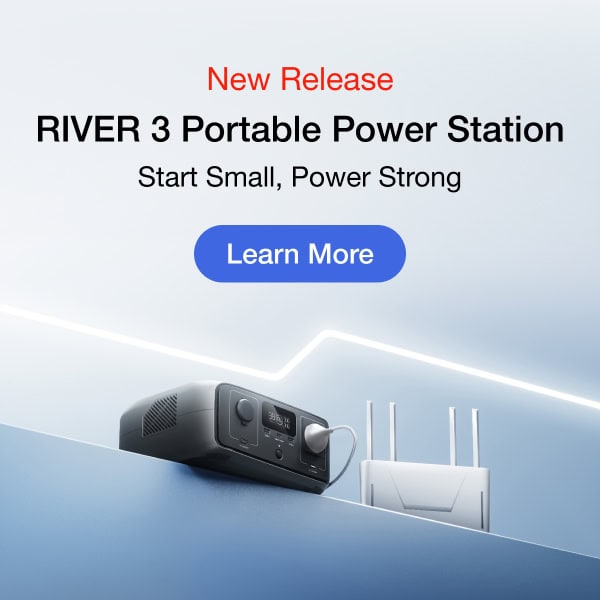Lithium Iron Phosphate batteries (also known as LiFePO4 or LFP) are a sub-type of lithium-ion (Li-ion) batteries. LiFePO4 offers vast improvements over other battery chemistries, with added safety, a longer lifespan, and a wider optimal temperature range.
These features have led to the widespread use of LiFePO4 batteries in solar generators, backup energy systems, and electric vehicles (EVs). This rise in popularity has led to a drastic price decrease in products that utilise LFPs.
Learn the numerous benefits of LiFePO4 and why it’s outpacing other batteries in various applications.
1. Longer Lifespan
LFPs have a longer lifespan than any other battery. A deep-cycle lead acid battery may go through 100-200 cycles before its performance declines and drops to 70–80% capacity. On average, lead-acid batteries have a cycle count of around 500, while lithium-ion batteries may last 1,000 cycles.
In comparison, the LFP battery in the DELTA 2 Portable Power Station from EcoFlow has a cycle life of 3,000+ before performance drops to 80% of its original capacity. They will still function well after this period but at a slightly lower capacity.
2. Improved Safety
LiFePO4 is a safer technology when compared to Li-ion and other battery types. Specifically, they don’t have the issues of toxic fumes and off-gassing associated with Lithium-ion and lead-acid batteries. LFPs have improved the technology to avoid these dangerous issues, using a non-flammable electrolyte as part of the battery’s chemistry.
Li-ion batteries may experience thermal runaway, overheating, and combustion. Lead acid batteries may produce toxic fumes, such as hydrogen sulphide. These issues are hazardous to safety and health.
LiFePO4 batteries do not emit gas like lead-acid batteries do. You can safely store and operate LFPs in sheds, garages, or inside your home.
LiFePO4 batteries also don’t use toxic chemicals or heavy metals in their chemistry, which allows for safer handling and disposal. Lead-acid batteries can leak harmful liquids without proper care.
The safety features of LiFePO4 batteries mean you can safely install products like the EcoFlow Power Kits inside a tiny home or motorhome. In the past, solar and backup batteries had to be stored outdoors in well-ventilated spaces to prevent any safety issues from harming the users. Not so with off-grid power solutions that run on LFPs.
3. Fast Charging
You can charge LiFePO4 batteries much more quickly compared to other battery types, typically within 1-2 hours using AC power and 3-6 hours using solar panels. The actual charging time depends on several factors, including battery capacity, current, and charging method.
Many portable power stations like the DELTA Pro utilise LiFePO4 batteries. They feature multiple charging methods, including:
- Solar Panels
- AC Wall Outlets
- DC Car Chargers
- Electric Vehicle (EV) Stations
LiFePO4 batteries charge fastest in optimal conditions. While LFPs still charge outside the optimal operating temperature range, you may risk damaging the battery and decreasing its lifespan, which brings us to the next point.
4. Wider Operating Temperature Range
LiFePO4 batteries have an operating temperature range between -4°F and 140°F (-20°C to 60°C). The temperature range allows them to perform well even in climates or conditions with extreme cold or heat.
However, keeping your LFP battery within its optimal operating temperature range will ensure higher efficiency and longevity. For example, the RIVER 2 Pro Portable Power Station recommends a storage and discharge temperature between 14°F and 113°F (-10°C to 45°C). Its optimal operating temperature range is 68°F-86°F (20°C-30°C).
Operating any battery outside its recommended temperature range can negatively impact its performance and lifespan. High temperatures can accelerate the battery’s ageing, reduce capacity, and increase the risk of thermal runaway. Low temperatures, on the other hand, can reduce the battery’s efficiency and capacity.
5. High Energy Density
LFPs have a higher energy density compared to some other battery types. Energy density refers to the amount of energy a battery can store per unit of volume or weight. LiFePO4 batteries have an energy density of around 130-140 Wh/kg — 4 times higher than the typical lead-acid battery density of 30–40 Wh/kg.
The high energy density means portable power stations using LiFePO4 are lighter and more portable. For example, the EcoFlow RIVER 2 weighs less than 8 lbs (3.6 kg) with 256 Wh of battery storage capacity.
Some Li-ion batteries have a slightly higher energy density than LiFePO4 but also have safety issues and shorter lifespans.
6. Eco-Friendly
As mentioned earlier, LiFePO4 batteries have a much longer lifespan than comparable Li-ion and lead-acid batteries. It means they require replacement far less often, leading to fewer batteries in landfills.
Even when they eventually wear out, investments in lithium battery recycling have diminished their negative environmental impact. Recycling allows for the reuse of internal components. Furthermore, LFP batteries do not contain heavy metals and toxic materials (such as lead and cadmium) used in other battery types.
The absence of cobalt in LiFeP04 means they can be much more ethically sourced than traditional lithium-ion batteries — which must be manufactured using nickel and cobalt. Over 70% of the world’s cobalt comes from mines in the Democratic of Congo.
Labour conditions in DRC’s mines are so inhumane, often using child labour, that cobalt is sometimes referred to as the “blood diamond of batteries.”
The high efficiency of LiFePO4 batteries also lends to their eco-friendliness. They require less energy to charge and discharge, reducing their environmental impact.
With power solutions compatible with solar panels, it’s possible to make LFPs even more environmentally friendly by using clean, renewable solar energy to recharge the battery.
7. Low-Maintenance
LiFePO4 batteries are low-maintenance compared to other battery types. Lead-acid batteries require you to check the electrolyte levels and refill them with distilled water. They’re also finicky when it comes to charging levels and storage conditions.
LFP batteries don’t require any electrolyte or water level maintenance. You should certainly keep an eye on vitals like charge and discharge levels, voltage, and related stats, but you shouldn’t have to spend too much time taking care of your battery.
With EcoFlow’s LiFePO4-powered solutions, you can monitor and control your battery usage from anywhere with the EcoFlow app.
8. Low Self-Discharge Rate
LFP batteries have a lower self-discharge rate than Li-ion and other battery chemistries. Self-discharge refers to the energy that a battery loses when it sits unused.
In general, LiFePO4 batteries will discharge at a rate of around 2–3% per month. Lithium Cobalt Oxide (LiCoO2) and Nickel-Cadmium (NiCad) batteries may discharge up to 20% of their energy each month when sitting in storage.
The low self-discharge rate makes LiFePO4 a better choice in home backup power systems. The batteries can sit unused for months while still being ready for use when a blackout hits.
However, it’s important to remember that all battery types will discharge over time, even when not in use. Proper storage and maintenance of LiFePO4 batteries will ensure optimal performance and lifespan.
Frequently Asked Questions
Yes, Lithium Iron Phosphate batteries are considered good for the environment compared to other battery technologies. LiFePO4 batteries have a long lifespan, can be recycled, and don’t contain toxic materials such as lead or cadmium.
Final Thoughts
With so many benefits, it’s clear why LiFePO4 batteries have become the norm in many industries. They’re becoming standard in electric vehicles, backup power solutions, and off-grid solar applications.
EcoFlow is one of the leading manufacturers of home backup and off-grid solar products that utilise LiFePO4 batteries. For safe, innovative solar generators, whole home power systems, and solar panels, shop EcoFlow today.





